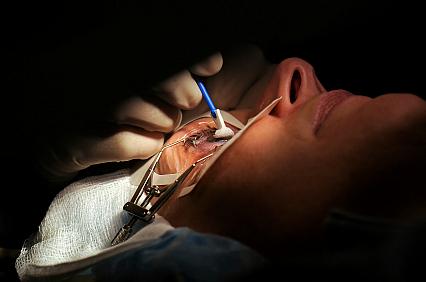Q&A with Dr. Stephen Hollis: Government tries to "terrorize" doctors into submission

 The first part of my conversation with Dr. Stephen Hollis, an ophthalmologist who has survived several run-ins with state and federal regulators, ran earlier this week. Hollis was featured as one of my Doctors Behaving Badly last year, but he is unrepentant about the things state medical boards and the federal government accuse him of doing. He's also indignant about the fact that doctors can't easily prescribe drugs to patients online.
The first part of my conversation with Dr. Stephen Hollis, an ophthalmologist who has survived several run-ins with state and federal regulators, ran earlier this week. Hollis was featured as one of my Doctors Behaving Badly last year, but he is unrepentant about the things state medical boards and the federal government accuse him of doing. He's also indignant about the fact that doctors can't easily prescribe drugs to patients online.
The second part our interview is below. It has been edited for space and clarity. The third part will run next week.
Q: How long did you practice in ophthalmology before you switched gears and went to work for an internet pharmacy?
A: In 1977, I finished my residency and went back to Columbus, Georgia. I had the biggest clinic in town.
Q: You had the biggest clinic in town right out of medical school?
A: No. (Laughs.) For the first five years, I almost starved. I was very religious and gave half my money every year to my church. And, you might not think there is a connection, but I think that there was because I saw five people in a row with cataracts and the fifth one was on his way from New York to Miami and wanted me to remove his cataract. I hadn't done many cataract surgeries, and this was the first day after I made this big pledge at the church. So, because I was still a little worried about how the surgery would turn out, I made this guy stay in town two weeks for me to follow him. He did and then went to Miami. When he came back through, he had me do his other eye.
Q: Did he write you a big check?
A: No.
Q: Then why do you think that this patient had some connection to your tithing to your church?
A: Because Columbus, Georgia, is nowhere on the way from New York to Miami, and yet he came into my office. Twice. It showed me that there was this demand for cataract procedures, and that I had a talent for it. I built the business into a 23,000 square foot office with 25 exam rooms. I just thought if you honor God, then God will bless you. Now I am the number one surgeon in the country in refractive surgery, based on volume.
Q: How do you know that you are number one?
A: You can't know for sure. But when I travel and lecture in my field, I have not heard anyone state they had done refractive surgery on more than 115,000 eyes.
Q: Why do you think you are so busy?
A: I just try to let people know that this is inexpensive medicine. I charge $695 for Lasik. There's a company who charges you $500 extra for custom Lasik, but I don't think custom Lasik has any proven benefits. There's a guy in Birmingham who charges $10,000. He could resent me because I charge less.
Q: A lot less. How is it possible for you to make money charging $695 per procedure when others in the market obviously think the procedure costs close to $10,000?
A: I do a lot of surgeries. And it's also how I structure my business. I earned half a million from my surgery center. I broke even in my practice, but my surgery center made money. Then I sold it and had a divorce and went to Atlanta and had a big crisis there. I got into a car wreck and broke my neck. And then I was indicted. During that experience, I realized that the purpose of government is to create monopolies so that they can rape society and someone in government is getting a cut. Medicine is owned by drug companies, and the drug companies are being aided and abetted by the government. Did you see "Love and Other Drugs"?
Q: No.
A: It was an incredible movie. I've never liked Anne Hathaway, but she was incredible in that movie, and I don't know if everything in this movie was true, but they talk about the power of these drug companies. It was said in this movie that the top 10 drug companies earn more profit than the rest of the Fortune 500 companies combined.
Q: Let's back up a bit again. You were accused of being too eager to operate on a glaucoma patient and of blinding a patient in one eye. What happened in that case?
A: An optometrist sent me a patient with glaucoma. We both measured glaucoma in different ways. The optic nerve cup had grown larger, which is a bad sign. The visual field test, which is one way to measure it, didn't show the problem. But I felt that the visual field test wasn't good in this case. So I based my diagnosis on optic nerve cupping, and that's how I was trained. I determined that the best course was surgery, but in the surgery they had an infection. And there's always a one in 1,000 chance you're going to have a complication including infection after surgery. That's just the statistics.
Q: So you didn't feel any responsibility for blinding this patient during surgery?
A: I feel that nothing I did was wrong. But there was a doctor who was an ophthalmologist on the medical board. He seemed to have something personal against me. He laughed when I told him that pressure varies according to the corneal thickness. He said I should have gone with the visual field test, even though that depends on the patient's response. It's not an objective test. Basically, one eye is getting worse. This patient is in danger of losing that eye. I think it would be malpractice not to operate. But this doctor on the medical board ruled against me. They offered me a settlement, and my attorney said, although you know you're right, go ahead and accept it. So I did. Then the patient had a lawsuit against me, and because the board had found against me, my malpractice company felt we had lost the lawsuit.
Q: How much did you have to pay?
A: About $155,000 that my malpractice company covered.
Q: The medical board said that you should have just prescribed the patient drugs to treat the glaucoma, not performed surgery? Is that right?
A: The patient was already on drugs and they weren't working. The appropriate thing was to do surgery. I disagree with the board completely, and I would have opposed them but my attorney recommended I do not do it.
Q: Where do your patients come from?
A: I'm in Auburn, Alabama, and 90 percent of my patients are from out of town. Beijing, Washington State, (the) Carolina(s). But most of them are from Georgia, Alabama, Florida and a little bit from Mississippi. They come because I have the lowest prices.
Q: How do they know about you?
A: Usually I've done a procedure on one person and they've told a friend or relative. I think I'm one of the best, and I do charge very low prices.
Q: Do you advertise?
A: There's a little disposable newspaper called American Classified where I will do an ad: "Hollis Lasik $695." I'll run those along the coast of Florida, and once you have one patient, they start sending others. I just started doing a little bit of radio advertising. I also do a TV commercial where I'm talking out of Columbus, Georgia, my hometown.
Q: Your public profile on the Alabama medical board's website says little about this discipline against you. Does it ever come up with any of your patients?
A: On my own website under "for doctors," I go through all my previous legal problems. I'm not hiding anything from anybody. With every patient, I tell them that I had a car wreck, and I tell them that I worked at an internet pharmacy and my idiot government indicted me for it. I am proud of standing up to my idiot government, and I am sorry that I took that plea bargain. I'm not trying to defend me. I'm trying to defend all the me's.
I don't think the government should have the power to indict me by going to the grand jury and not showing me the evidence. I wanted to tell that judge, "I may be dying of cancer, but if you think I am going to die with my head hung low because my government is trying to terrorize me into submission, you have it wrong." I actually took the plea bargain because I loved my government, and I didn't want to make them look bad. Now I know that they are just keeping doctors like me from doing what's right for our patients.
Related Posts:
Q&A with Dr. Stephen Hollis, Part 1: Ban online Botox, but make other drugs more accessible
Doctors Behaving Badly: Eye doctor prescribed drugs to patients, sight unseen
